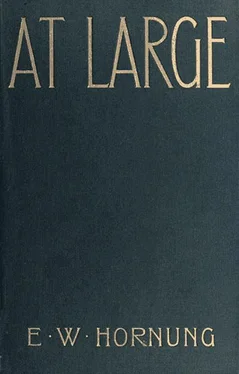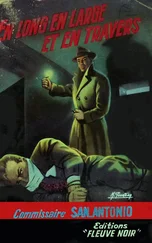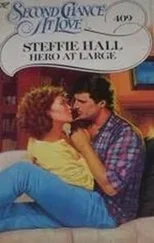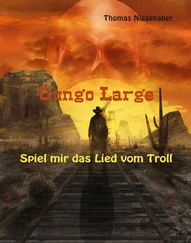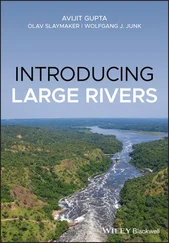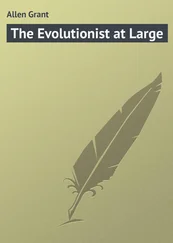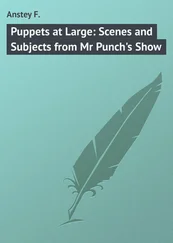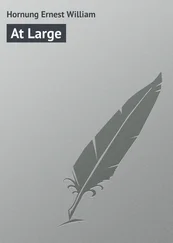E Hornung - At Large
Здесь есть возможность читать онлайн «E Hornung - At Large» весь текст электронной книги совершенно бесплатно (целиком полную версию без сокращений). В некоторых случаях можно слушать аудио, скачать через торрент в формате fb2 и присутствует краткое содержание. Жанр: Старинная литература, на английском языке. Описание произведения, (предисловие) а так же отзывы посетителей доступны на портале библиотеки ЛибКат.
- Название:At Large
- Автор:
- Жанр:
- Год:неизвестен
- ISBN:нет данных
- Рейтинг книги:3 / 5. Голосов: 1
-
Избранное:Добавить в избранное
- Отзывы:
-
Ваша оценка:
- 60
- 1
- 2
- 3
- 4
- 5
At Large: краткое содержание, описание и аннотация
Предлагаем к чтению аннотацию, описание, краткое содержание или предисловие (зависит от того, что написал сам автор книги «At Large»). Если вы не нашли необходимую информацию о книге — напишите в комментариях, мы постараемся отыскать её.
At Large — читать онлайн бесплатно полную книгу (весь текст) целиком
Ниже представлен текст книги, разбитый по страницам. Система сохранения места последней прочитанной страницы, позволяет с удобством читать онлайн бесплатно книгу «At Large», без необходимости каждый раз заново искать на чём Вы остановились. Поставьте закладку, и сможете в любой момент перейти на страницу, на которой закончили чтение.
Интервал:
Закладка:
Yes, tired—and sleepy too. If writing a diary has always this effect upon me, it will more than fulfil its original mission—which was only to help me to pass the intolerable time!
Tuesday, 10th.—I was up and out quite early, long before breakfast, on a voyage of discovery. The first thing I had seen, on drawing up my blind, was red-tiled Gateby, straight in front of my window, across half-a-dozen fields. I could see a path winding through these fields, and coming out into the road just below our house; so on this pathway I settled for my first walk. I could see that it was the shortest way to Gateby. I would inspect Gateby.
It was a perfect morning, with plenty of sunshine and blue sky, and the last of a soft white mist just filling up the hollows of the meadows; so that I knew that it would be a hot day, as, in fact, it is.
When I had followed the path across the fields until I had only two left to cross (and these were a potato field and a meadow, from which a boy was driving in the cows), I stopped and perched myself on a stone gate-post, and surveyed Gateby. From there it looked like one long low irregular building, stone-built and red-tiled. Only one house, and that at the extreme left of the rest, was slated. More of Gateby I could not see from there, so I went on looking all round me. Over the village rose the hills, with bold but even outline. The hillsides are so evenly divided by the hedges into so many squares that they look as though great nets had been cast over them. The squares have all kinds of colours—greens, and yellows, and dirty browns (of ploughed fields). Following the bend of the valley, as the fields grew less in perspective, I noticed that they took a commoner tint, between pale green and dun, until the farthest range of all showed a uniform greyish-blue. I did not expect to be able to see half so far when deep down in a dale, and I thought the hills would be higher. In fact, with this particular dale of ours I am a little bit disappointed; for, instead of finding it a deep furrow in the face of Nature, as I had made up my mind it would be, it is, after all, the veriest dimple.
Well, Gateby is a quaint enough little place when you attack it fairly, from the front, as I presently did. It has about a dozen houses all told, and they are all on one side of the road, and hug each other as though space were an object of the first importance. Several of the houses are, at least, demi-semi-detached. The largest of them is the public-house; the best the schoolhouse, the front of which is simply one mass of pink roses—I never saw anything like it.
I walked back by the road. The pathway through the fields merely cuts off, I now found, the angle made by the two roads: the road in which we are, which leads over the moor, and the road in which Gateby is, which leads in one direction to the railway, six miles off, and in the other—I don't know where. These two roads join at right angles, and I believe they are the only roads in the dale.
Nearing home, I met the person with the gay-coloured nose and eyes, and he stopped to bid me good morning. I thought his complexion looked a little cooler, but then it was very early morning. He inquired, with some pride and expectancy, what I thought of the dale. I answered, rather unkindly I am afraid, that I thought it pretty, but a fraud: the hills were too low, the valleys were too shallow.
"Ah!" he observed compassionately, "waät till thoo's been ower t' mower, an' seen t' view from Melmerbridge Bank; an' waät till thoo sees Beckdaäl!"
He went on to tell me all about Melmerbridge. I almost think he offered to personally conduct me over to Melmerbridge, and to show me its church, and its beck, and the view from its bank. At any rate, before I could get away from him I had learnt that his name was Andy Garbutt, and that he had been eight and twenty years, man and boy, come next Michaelmas, in the service of the owner of our nameless shooting-box.
I found papa ready for breakfast, and delighted to find that I had been out and about so early; there was no need to tell him that it was simply because I could not sleep or rest. And of course we both duly voted the real Yorkshire bacon the very best we had ever tasted in our two lives; though, for my part, I must own I only swallowed it to please papa, whose eye was upon my plate.
In the afternoon we walked up to the moor together, and papa was charmed because we "put up" quite a number of birds. I could not stay long, however, as papa wished me to drive off to meet Mrs. Parish, and I am writing this while waiting for the trap, because, somehow, I cannot settle to reading—not even yellowbacks. A horrid nuisance, her coming! I do wish it had not been just yet. By-the-bye, papa tells me he has heard from Mr. Miles, who, after all, has not yet left England, his business having turned out different from what he expected. Then how strange that we have never heard from him all these weeks! I quite thought he would be out there by this time. However, he says he really does sail in a few days, and he only wishes he saw his way to running down to say good-bye to us—but that will be impossible. I believe papa has written to him, telling him all about the place, and the prospects, and who are coming. I am not sorry that he is not coming, I think. This reminds me that papa says that Dick Edmonstone has written saying that he cannot possibly come. I am not at all sorry to hear that. I think he shows his sense.
Thursday, 12th.—Everybody came yesterday; and now they are all on the moor, and we two women are to go and have lunch with them at one. There are five guns, and we hear them distinctly from time to time. Besides papa, there are Cousin Philip (who likes to be called Doctor Robson now), and Laurence Pinckney, and Captain Awdry, and Mr. Oliver.
Cousin Philip has been a long voyage to New Zealand and back, as ship's surgeon, since we last saw him. It ought to have improved him, and perhaps it has; but to me he seems as dull and ponderous and undecided as ever. He tells me that he interested himself at sea by getting up prayer-meetings in the steerage, which, he says, had far more heart in them than the captain's perfunctory services on the quarter-deck; but it seems that his zeal got him disliked—most unrighteously—by the other officers. He is certainly a good young man. Captain Awdry I have met once or twice before; he is a great beauty, a great sportsman, and that's all; but Mr. Oliver is new to me. I fancy he is local—an ironmaster or something. He is old, and tall, and well set-up; very deferential to me, if you please, and tremendously keen about the grouse. As for Laurence Pinckney—one has to call him Mr. Pinckney now—he is nothing short of a revelation.
When I knew him before, he used to go to some public school—I forget which, but it can't be many years ago. And now he is a "writing man," fresh from Fleet-street, with all the jargon at his tongue's end—and, in short, quite the most amusing boy. In appearance he is just what he ought not to be. I have always pictured to myself the literary man—especially the literary young man—with long hair and eye-glasses, and the rest bizarre. Therefore Laurence Pinckney disappoints me; he is spruce, brisk, and sharp-eyed, short, dark, and unguarded.
He sat next me at dinner, and talked nothing but his "shop"—which, however, is a kind of "shop" that rather interests one; besides, the egotism of a raw recruit in the noble army of authors is really diverting. He talks fluently about all the new books, criticising most of them severely, and I should say that he has read and remembered at least two or three reviews of each. He has told me the different magazines he writes for, so that I shall know where to seek his name—if I don't forget. He "thinks nothing of bearding literary lions in their editorial dens;" and this, I shouldn't wonder, has something to do with that drawer full of rejected MSS. of which he has already been frank enough to whisper—in fact, he has quite taken me into his literary confidence. But indeed he is rather amusing.
Читать дальшеИнтервал:
Закладка:
Похожие книги на «At Large»
Представляем Вашему вниманию похожие книги на «At Large» списком для выбора. Мы отобрали схожую по названию и смыслу литературу в надежде предоставить читателям больше вариантов отыскать новые, интересные, ещё непрочитанные произведения.
Обсуждение, отзывы о книге «At Large» и просто собственные мнения читателей. Оставьте ваши комментарии, напишите, что Вы думаете о произведении, его смысле или главных героях. Укажите что конкретно понравилось, а что нет, и почему Вы так считаете.
